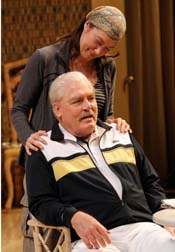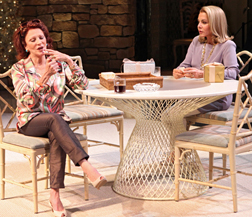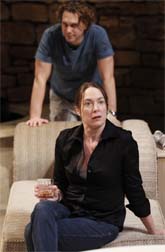By Lucy Komisar
This is a very New York play even if it takes place in Palm Springs, California. Playwright Jon Robin Baitz tells what happens when a New York writer who lives in Sag Harbor (where a lot of New York writers go in summer), journeys west to visit her extremely Republican parents. Extremely means they were friends of the Reagans.
Baitz lives in Brooklyn and is on the faculty of the New School Drama Division in Manhattan. He’s also at home in movieland and teaches at the University of California/Santa Barbara writing program. I think he should stay in New York. I will explain.

Brooke Wyeth (given a portrayal of great range that one has come to expect from Elizabeth Marvel), had suffered a depression that sent her to a hospital and keeps her on medication. After six years she’s visiting her parents. Rather than be sympathetic, her mother Polly (Stockard Channing) is cold. Channing expertly channels her as tough, rigid, and controlling. Her father Lyman (Stacy Keach) is exacting, like a general. Laid-back brother Trip (Thomas Sadoski), who lives in LA and produces a dumb TV game show (is dumb redundant?), wants everyone to cool it.
The surroundings speak wealth. The living room, with a curved stone wall and a smoke cone over an open fireplace, was designed rather than built. (The set is by John Lee Beatty.) The seating is on three chaises, all separate. In a corner stands a fake Christmas tree densely hung with gold bulbs. Fine, except they are Jews and are planning to celebrate with dinner at the country club. Other desert cities is a subtle put-down of Palm Springs; the words appear on a highway sign. Baitz deftly depicts the sociology of these folks, and director Joe Mantello keeps the action moving smartly.

Brooke has brought her manuscript of a family memoir that deals with an episode her parents want to forget, but was the cause of her emotional breakdown. As a troubled young man in the 1970s Vietnam War days, her brother Henry joined a Venice, Calif. (think hippie and drugs) group that blew up an army recruiting station. A worker inside was killed. Not long after, Henry’s belongings were found with a suicide note on the deck of a ferry going to Canada. Brooke blames her parents: they never let the kid be himself, they cut his hair, they sent him to a school for delinquents.
What else could you expect from her father, Lyman, an actor who went into politics, became head of the state Republican party, and then was named an ambassador? Father owns a gun. Mother says, chink food and thinks war is justified. Brooke quips, This is America; we get warm and fuzzy about war.
They don’t want her to publish the book. Baitz laces the conflict with funny one-liners. Polly: Now you know what I believe in. Brooke: Aside from the right to bear arms?

Polly’s sister Silda (Linda Lavin), who wrote a series of B movies with her, is a recovering alcoholic but seems to see quite clearly. Lavin is terrific in the role, giddy, saucy and cynical. She is fighting to stay sober, but the downside is, she says, I have more Nazi dreams than Elie Wiesel. But she is also solid, sensitive and smart.
Polly criticizes Silda’s multi-colored blouse that probably came from a thrift shop. Silda is out of work and dependent on her sister for a place to stay. (Both women wear pencil slacks and high heeled shoes, even around the house. Is that the West Coast bourgeois uniform?)

Marvel is brilliant in displaying Brooke’s seething, suffering, distraught fury. She accuses her mother of being a bully and her father of rejecting his son. What can you expect, Brooke declares, dissing the zealots who’ve taken over your party and their silence over the war. It’s 2004, so now it’s the new war.
So, we know who are the good guys and the bad guys, right?
The family clash goes on too long. Then comes the surprise melodramatic ending. I found it disappointing, a Hollywood dénouement that wraps up the plot a little too facilely and makes the set-up hard to believe. Still, till that moment the play is absorbing and entertaining.
Other Desert Cities. Written by Jon Robin Baitz; directed by Joe Mantello. Newhouse Theater, Lincoln Center, 150 West 65th Street, New York, NY. (212) 239-6200. Opened Jan 13, 2011; Closes Feb 27, 2011.

